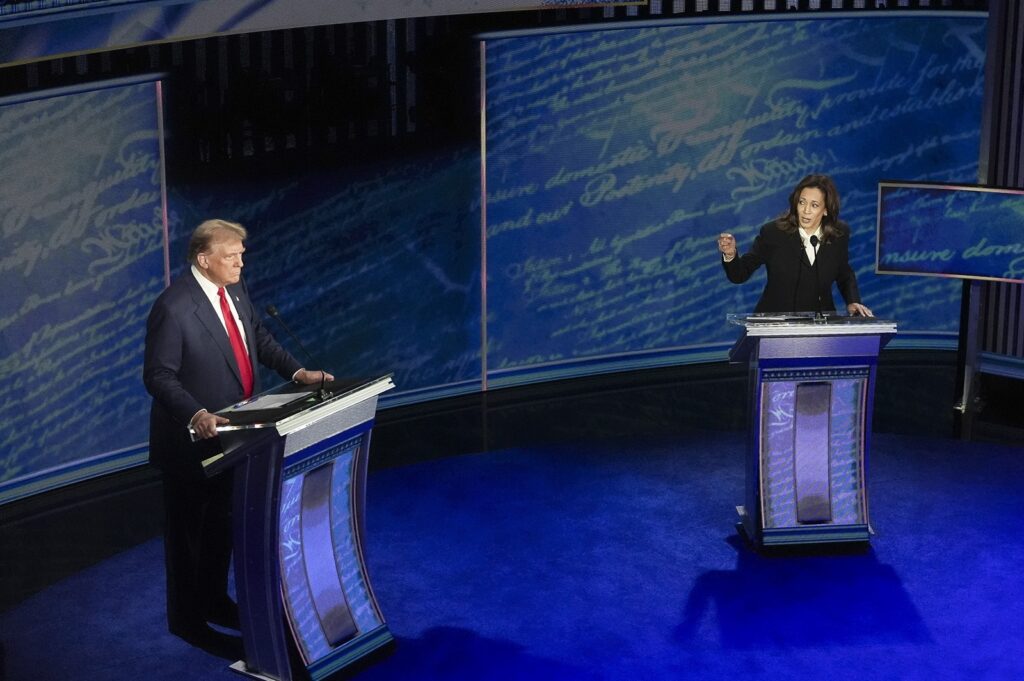The https://english.atlatszo.hu use cookies to track and profile customers such as action tags and pixel tracking on our website to assist our marketing. On our website we use technical, analytical, marketing and preference cookies. These are necessary for our site to work properly and to give us inforamation about how our site is used. See Cookies Policy
What can Hungary and the EU expect from the next US President?
Will Trump bring about peace and Paradise on Earth? Or the opposite: a trade war with Europe? And what role could Prime Minister Viktor Orbán play in this? Whose problem will Russia be in the future? The United States elects a president in a week’s time, so we’ve been looking at how the 47th President of the United States will be called.
In about a week’s time, the world’s number one superpower will elect a president. Tuesday 5 November will also decide whether the Democrats or the Republicans will have a majority in the US House of Representatives. As the political direction of the US will largely determine the European Union’s room for manoeuvre, and the Hungarian prime minister has put all his chips on Donald Trump’s presidency, we have been talking to experts about what Hungary and the European Union more broadly can expect in the event of a Harris or a Trump administration.

What is clear is that there is consensus between Democrats and Republicans on the most important issues. These include the primacy of US economic policy and the protectionist measures that this entails, which could also have a negative impact on European countries, among others. This is also the reason for the launch of the trade war against China, which both Harris and Trump agree on, in addition to their parties. There is also a Democratic-Republican consensus in support of Ukraine, but here the position of his party may differ from that of Trump, who has made several statements on the issue and no one really knows what he would do on Ukraine, but it seems that the majority of Republicans would continue to support them in their fight against Moscow.
The main difference between Trump and Harris may just be their attitude.
This was confirmed by the Berlin-based head of the German Marshall Fund, a think tank working to improve US-European relations:
“There is a consensus between Republicans and Democrats on economic policy, and some Republicans along with Democrats support Ukraine, and in fact want the Biden/Harris administration to do more. However, there is a fundamental difference between the two candidates. While Harris is capable of compromise and values allies and transatlantic relations, President Trump is transactional (a self-interested, rule-breaking political outlook) and unpredictable, which does not sit well with the partnership.” – Sudha David-Wilp told Átlátszó.
This was confirmed by several experts on US politics. Trump’s “America first” policy will be exclusively in his own domestic political interests, while Harris is expected to continue the values-based politics typical of Democrats. At the same time, the European Union cannot fall back under a Democratic leadership, as the measures to protect the US economy and the trade war against China could also have a negative impact on European competitiveness. One need only think of the German car manufacturers, who have indicated in advance that they do not agree with the tariffs on Chinese electric cars, which would mean, for example, that Volkswagen’s e-cars made in China would also be subject to EU tariffs, but which the Council of the European Union voted in favour of in accordance with American political interests.
But Trump’s presidency could also lead to more serious struggles and discord in transatlantic relations. It is enough to recall some of the statements by the Republican presidential candidate that he wants to Americanise the German car industry, and that he would probably achieve this by blackmailing the car manufacturers, who would lose the US market, by imposing huge import duties. Import tariffs would be a feature of Trump’s policy anyway, and the European economy would also suffer. According to news reports, the EU institutions are already trying to prepare for this and are preparing a response to Trump’s measures.
Viktor Orbán building bridges?
And Viktor Orbán is hoping for exactly this scenario. In recent years, he has poured a lot of resources and energy into building relations with the US Republicans and Trump, and Balázs Orbán has played a key role in this, along with the Miklós Szánthó-led Center for Fundamental Rights. From this point of view, it is understandable that the Prime Minister could not afford to sack his political director because of his remarks about the ’56 revolution, especially before the US presidential elections. After all, in the event of a Trump presidency, all the money and work invested could really pay off, and Balázs Orbán could play a key role in maintaining relations.
Viktor Orbán’s unhidden goal is to act as a bridge-builder between the United States and the European Union in the event of a Trump administration, thus enhancing his position in the EU. However, there are several problems with this. The most important one was pointed out by Jana Puglierin, a senior fellow at the European Council on Foreign Relations (ECFR):
“Viktor Orbán can hardly be a bridge-builder between the US and the EU, as he has already burned almost all bridges with the latter.”
In addition to the words of the Berlin staff member, the fact that during Trump’s first term, Theresa May, who was Prime Minister of the United Kingdom during Trump’s presidency, and French President Emmanuel Macron, have aspired to a similar role, adds to the fact that the EU’s President has been a “political partner” for the past two years. Both failed in this role, simply because the US president proved to be a unreliable partner, not seeking compromise and, when he promised something, breaking it without a second thought when his interests demanded it.
On this basis, it is difficult to imagine that Trump’s “America first” policy will soften at the Hungarian Prime Minister’s word, but it may be even more interesting to see what Donald Trump will say about the dumping of Chinese investors, which is being proclaimed as Hungarian economic neutrality. The Republican candidate’s foreign policy is centred on China and the trade war declared against it. And he has repeatedly stressed that he expects alignment from his allies. Such an expectation would also damage Hungary’s sovereign foreign and economic policy; it would be interesting to know whether the Hungarian government would be as militant in defending it as it is currently with our Western allies.
The question of Ukraine
The most divisive question is what will happen to Ukraine and its support for the Russians in their war against them. It must be seen that, on the merits, it has so far been two countries that have supplied Kiev with money and arms. That is the United States and Germany. It has also been observed that Berlin has always aligned itself with Washington in the transfer of key arms to the Ukrainians. The latter was said by Daniela Schwarzer, Bertelsmann Foundation board member and former European director of the German Foreign Policy Association (DGAP) and the Open Society Foundation (OSF), during a panel discussion.
While there is also a consensus among the US parties on support for the Ukrainians, it is expected that both Harris and Trump will seek a peace deal. The main reason for this is that US attention is increasingly shifting towards China, and it would not be able to take on two such conflicts with the world’s other two great powers at the same time. Trump has said many different things about Ukraine, and there is no telling how radical a solution to the conflict he would propose, and what loss of territory and interests it would entail for President Zelensky.
In contrast, Schwarzer says that Harris always mentions Ukraine as an important partner in his international outlook, but
it is clear that even under a Democratic administration, the US attention will shift to China and the EU will have to be able to guarantee its own security.
There is a consensus among the experts: Europe may increasingly be left to its own devices in the conflict with Russia and will have to be able to guarantee its own security sooner or later. If the Sino-Taiwanese conflict escalates, we could expect a quick shift of attention even under a Democratic administration, but if Donald Trump wins the upcoming presidential election, the EU could soon find itself alone in the shadow of the Russian threat. And a Europe facing the Russian problem alone is not good for anyone, including Hungary.
Translated by Zalán Zubor. The original, Hungarian version of this story was written by Milán Dóka and can be here. Cover photo by MTI/EPA/The Washington Post pool/Demetrius Freeman

